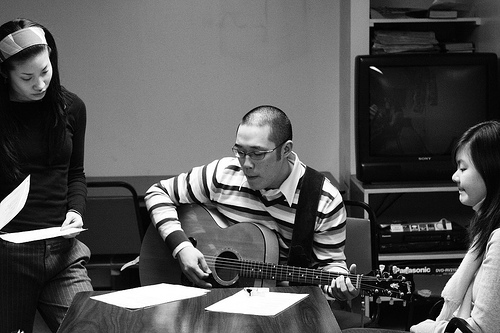Myths of Guitar Practice
• Structured practice is pointless, it takes away the fun of guitar playing and stifles creativity
• Practice doesn’t even work, I learn more by simply picking up my instrument and doing whatever I please
• Doing the same thing every day won’t help be learn anything

Debunking the Myths
1. If you have a negative attitude towards structured practice, you won’t benefit from it, because no matter what you learn, the negative feelings dominate your thinking and are telling you you’re wasting time
2. A good, structured practice session will actually make you more creative, as you will learn and become confident using a new skill or technique.
3. If you have an objective, such as learning how to play Blues styles, then your practice will be fun and have a purpose
4. Ultimately, what and how long you practice for is down to you, so if it does get boring or tiresome, change it up a little!
Your Personalized Practice Schedule
Look to the Future
Start at the end of your practicing regime, and ask yourself what the ultimate, long-term aim is for you as a guitarist. Think in terms of your own style and about what you can do with the instrument, “I want to be the next Slash,” sounds great, but is a little ambiguous to work with in terms of becoming better yourself.
From here, put together the pieces and come up with a step-by-step process that will take you to your aim.
Strengths vs. Weaknesses
While you should put more time into honing your weaknesses, failure to practice your strengths will eventually see your standard of playing drop. One way to look at your strengths is to imagine yourself becoming famous; these strengths will be your trademark and inspire players to pick up a guitar themselves. Work on your weaknesses, but do not forget to pay homage to what you’re good at; it will help your confidence, too.
Be Realistic
If you can only practice guitar for an hour a day, then work with it. The quality over quantity argument definitely comes into the equation here. If your one hour a day is quality, dedicated practice where you can focus on what you need to, this is much better than stolen chunks of ten minutes here and there throughout the day.
Do not commit yourself to three hours of guitar practice each day if you are unable to do so.
Build in Application Time and Free Time
A lot of guitar practice sessions work like this: Guitarist practices new technique, approaches end of session, does their own thing, starts again next week from same point in respect of new technique.
Instead, make sure you give yourself the time in your practice session to apply what you have been working on. Keep the free time at the end of your session to do your own thing, but ensure that application comes first.
Keep Your Sessions Fresh
Keep sessions fresh by having a variety of different things to practice and work on.
If you’re not working to a regular pattern, the chances of you getting bored and demotivated are far less.
Image Source: doobybrain
Are you a guitarist? Check out our full range of online guitar lessonsAre you a saxophonist? Check out our full range of online saxophone lessons
Subscribe to Pro Music Tutor from as little as £7.99 per month
Related Posts
-
Why You Should Be Learning a Second Instrument
Learning your first instrument can sometimes feel impossible. Why on earth would you want to learn a second? I’m going to use this article to convince you that learning a second instrument is not only a great use of your time, but it may be better than spending time with your first instrument! Considering the […]
View All >> -
5 Easy-to-Learn Guitar Riffs to Impress Your Friends
When you’re first starting out learning how to play the guitar, it can be quite frustrating to stay motivated. It’s practicing the same chords, the same strumming and fingerpicking patterns, the same scales and songs over and over. It’s also pretty hard to impress your friends or girls with your noob skills, so ultimately you […]
View All >>
Latest Blog Entries
-
The Benefits of Online Music Education
Learning music has never been easier, since the internet and modern technological advancements have opened the doors to countless possibilities, expanding the subjects people can choose from and how the lessons are taught. Now, people can study a whole host of music-related topics; from learning to play guitar or DJing, to understanding the inner workings […]
View All >> -
Essential Jazz Guitar Scales that are Easy to Learn
Improvising in jazz requires the ability to play in different keys over different chords. Results certainly do not come overnight, but with diligent practice, you would be surprised by what you can achieve. Many people ask me about what scales I use as if they were some big secret. While knowing your scales is very […]
View All >>
Blog Categories
- Categories
- Guitar Tips (93)
- History (36)
- How-To (38)
- Interviews (3)
- Music Industry (121)
- Prolinks Guitar (2)
- Prolinks Lessons (3)
- Prolinks Tutor's Profile (1)
- Saxophone Tips (40)
- Uncategorized (6)
Tags
Archive
- November 2018 (1)
- February 2018 (1)
- December 2017 (1)
- November 2017 (1)
- October 2017 (1)
- July 2017 (4)
- May 2017 (2)
- April 2017 (1)
- August 2016 (2)
- July 2016 (1)
- June 2016 (2)
- May 2016 (3)

